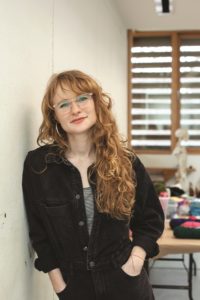H.R. Webster has a poem provocatively titled “Failure.”
“I have made fun of the way language/ is always finding its own end,” she writes. “I have made fun of these failures but here I am saying/ this sadness is sad.”
“Poetry can be a celebration of the way language fails us and our imaginations,” says Webster, a Fine Arts Work Center fellow for the second time. The poem, originally published in No Tokens in 2019, will appear again in What Follows, to be published by Black Lawrence Press in June.

Webster is capping her current residency with a reading on Saturday, April 16 together with writer Vedran Husić. Her first FAWC fellowship was in 2017-2018, two years after she completed an M.F.A. at the University of Michigan. She graduated in 2012 from Vassar College with a B.A. in English and religious anthropology.
Webster calls Waxhaw, N.C. her hometown, though she didn’t live there long. Her family moved to Colorado, then Ohio, then Virginia, before finally landing in New Hampshire. Her parents “don’t quite grow all their own food, but they’re pretty close to it,” she says. “I grew up learning a lot of those homesteading skills: working with animals, gardening, preserving food, and sewing.”
Growing up close to the land made her intimately familiar with the cycle of life and death. This didn’t make her a “pastoral poet” so much as a “necro-pastoral poet,” she says.
In her poem “The Calf,” Webster observes one “born too slow. Hooked hip, hooked breath./ She could stand, could nurse but could not stand and nurse at once.” When the calf dies a week later, she is buried in the same cemetery as “the quails we raised from eggs, holding them to the incubator bulb/ to see the chick sharpening inside.”
“If you look back at the tradition of poetry about life on farms, it typically pictures it as peaceful and idyllic,” Webster says. This “imagined idyll” of farm life not only ignores the death but fails to acknowledge “the history of colonialism in America, the history of chattel slavery in America, and how this centered on relationships to the earth and growing things.”
During the six years she lived in Michigan, Webster taught writing to students in kindergarten through grade 12. She also taught poetry to incarcerated adults through the University of Michigan’s Prison Creative Arts Project.
Since the pandemic, Webster has provided prison mentorship entirely through written correspondence. But she misses in-person teaching and finds the issue of audience becomes more complicated. Everything that she sends to her students is read by a prison official for whom the correspondence was not intended.
Webster has organized for abolition of prisons with several organizations. She was excited to see the idea of mutual aid — community members providing direct resources to others — take off during the pandemic. She sees poetry as “a site of radical imagination that is vital to abolitionist organizing.
“I think of prison abolition explicitly in terms of political consent,” she says. Reading work to an audience is “a relationship of consent between writer, audience, and subject. It gives us space to explore and consider consent beyond narrow definitions.”
Webster says ideas she’s encountered through activism, especially about sexual violence, have informed her poems. Transformative justice, which examines ways to address harm without perpetuating more harm on the individual or societal level, provides “an adjustable arc to the kind of sexual violence my work deals with.”
Over the past four weeks, Webster taught a unit called “Poetry and Peace” to eighth-graders in the International Baccalaureate program at the Provincetown Schools through a Fine Arts Work Center grant. She has a soft spot for this age group, even though “I never thought I would say that because if I think about being that age, it was ‘battle royale’ within myself,” she says. Webster finds that middle schoolers “have a beautiful grasp of the potential and power of metaphor.”
Webster finds students come to class with an understanding of poetry as a way of processing feelings. While she thinks that’s invaluable, especially during a global pandemic, she wants to impart to her students that poetry can be “an act of witness” and a way of imagining a better future.
Words Have Power
The event: A reading by Fine Arts Work Center writing fellows H.R. Webster and Vedran Husić
The time: Saturday, April 16 at 7 p.m.
The place: Stanley Kunitz Room, Fine Arts Work Center, 24 Pearl St., Provincetown; or online at fawc.org
The cost: Free



